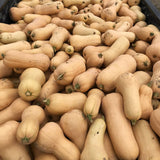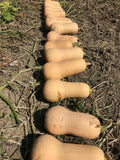Waltham Butternut Squash
Cucurbita moschata
Vigorous and dependable with abundant 8-9" fruits with sweet, orange flesh. Terrific for baking. Properly stored, the fruits are great keepers. The very hard stems on these plants make them particularly resistant to squash vine borers. Waltham Butternut was an All American Selection in 1970.
This variety was bred in the 1940s by Charles Leggett of Stow, Massachusetts, who shared it with the agricultural research station in Waltham, Massachusetts where it was further selected and refined by Professor Robert Young. Mr. Leggett was an insurance man, and happened to breed one of the best winter squashes out there in his free time. He is said to have named it because it is "smooth as butter, sweet as a nut." The land where he grew this squash is now an 18-hole golf course called Butternut Farm Golf Club. Thank you Mr. Leggett for your amazing work! It is a hole in one.
Days to maturity: 85-105
Seeds per pack: 30
Germination rate: 89% on 03/17/2025
Planting / harvesting notes
Direct sow in warm soil after the last frost, or seed indoors 2-3 weeks beforehand and transplant. Plant 3 seeds per hill spaced several feet apart, or seed in rows, one plant every 2-3 feet. Vines grow at least 10' if not much longer, so allow them space to sprawl. If grown in corn, you may need to train them so they won't pull it down! Avoid downy mildew by watering only at the base of the plant (not on the leaves!). Harvest when the stem begins to turn brown and woody and the fruit becomes hard, leaving a couple/few inches of stem. Cure in a dry or sunny place for a week, and then store in a cool (45-50 degrees) room for up to 5 months (however, keep an eye on it and use it at earliest sign of softening if not before).
Seed keeping notes
Squash is insect pollinated and requires about 1/2 a mile of isolation from other varieties of the same species, which in this case is C. moschata. The seeds will be fully mature on any squash when the stem of the fruit has turned brown and woody, so when you eat your squash, the seeds should also be ready for harvest. Separate the seeds from the flesh, rinse them, and dry them on a screen or paper product away from direct sunlight in a ventilated place. The plumpest and hardest seeds will be most viable.







